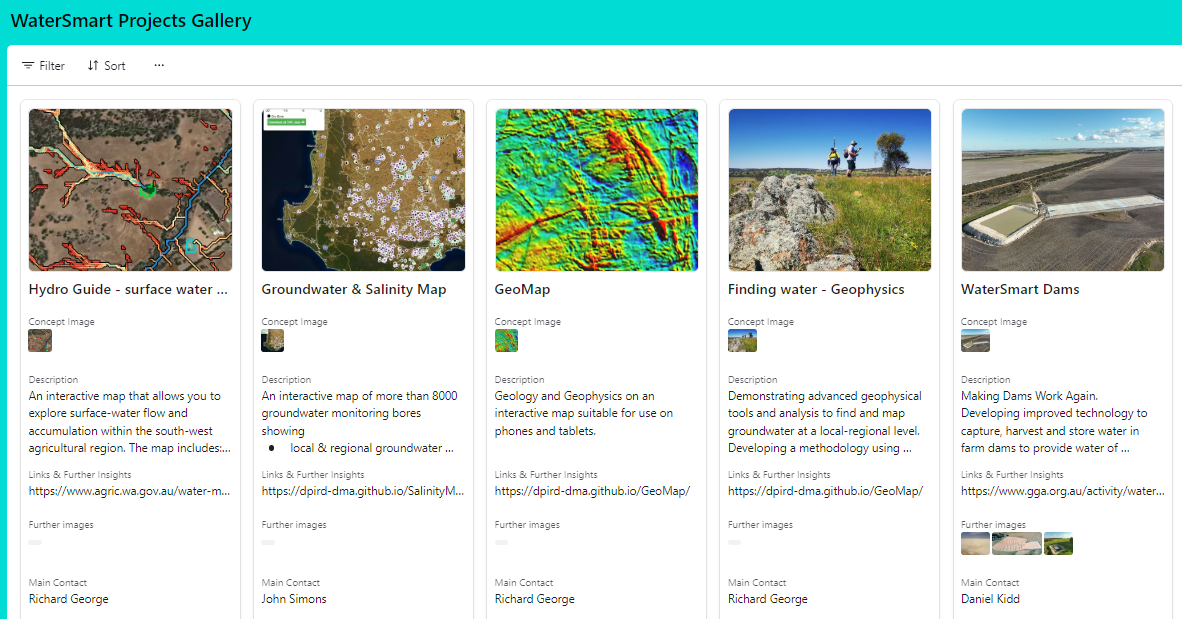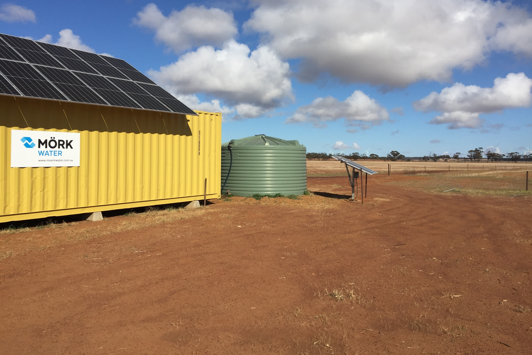What is the WaterSmart Farms project?
The WaterSmart Farms project has supported adopting on-farm desalinisation plants in WA's Grainbelt and Great Southern regions to process brackish groundwater into a suitable resource for livestock, crop agronomy and other agribusiness activities.
Adaptation is a key response to manage in an increasingly variable climate. With drier and hotter conditions, securing water in regional areas is critical to enable agriculture and sustain regional communities.
Decision support tools
Use this interactive online map to:
- Idenfity more than 8,000 groundwater monitoring bores.
- Understand local and regional groundwater trends.
- View areas of satellite-mapped salinity since 2018.
- Note hazard areas with potential shallow water tables and salinity.
Features of this useful tool:
- Suitable for geology and geophysics.
- Simplified version of the Department of Energy, Mines, Industry Regulation and Safety (DEMIRS) GeoView-WA.
- Suitable for use on a tablet or mobile phone.
- Able to send site coordinates for assessment.
Use this guide to review:
- Modelled surface-water flow and accumulation within the South-West agricultural region.
- Farm dams mapped by the department's AI systems and known large water bodies.
- Land surface contours and terrain slope.
- Areas of potential inundation.

WaterSmart projects gallery
Find out more about the WaterSmart projects across WA, including dams, desalination and water quality management.
View the projects galleryWhat are the WaterSmart Farms projects?
Adaptation is a key response to manage in an increasingly variable climate. With drier and hotter conditions, securing water in regional areas is critical to enable agriculture and sustain regional communities.
The WaterSmart package of work aims to investigate sustainable water supply options and optimise on-farm use of groundwater, new desalination technology and novel treatments to existing farm water dams to provide suitable water for livestock, crop agronomy and agribusiness activities.
Some of the major projects are:
WaterSmart Farms
-
Desalination and inventory and analysis - collaboration with Murdoch University
Understanding adoption and use of on-farm desalination units that process brackish groundwater into a suitable resource for livestock, crop agronomy and other agribusiness activities. -
Desalination demonstration sites - collaboration with Water Corporation and Murdoch University
Reverse Osmosis (RO) desalination units have been installed in 4 communities at Dumbleyung, Merredin, Katanning and Wongutha. Research will help with optimising desalination technology and assessing its viability as supplementary or alternative water supply, including evaluating ways to manage reject water. -
Fractured rock aquifer investigations - collaboration with Curtin University and DEMIRS
Undertaking a targeted groundwater exploration program to develop a geophysical methodology to assess the viability of fractured rock aquifers as a source of fit-for-purpose (brackish) water.
WaterSmart Dams
-
Making dams work again - collaboration with Grower Group Alliance (GGA) and University of WA
Developing improved technology to capture, harvest and store water in farm dams to provide water of sufficient volume and quality to meet industry need. Building evaluation and economic tools to assist farmers in decision making.
WaterSmart industries
-
Investigating brackish groundwater resources - collaboration with CSIRO and DEMIRS
Assess 2 pilot palaoechannel aquifers, utilising mining and exploration tools (such as AEM) to find fit-for-purpose groundwater, plan and test options to support regional agribusinesses. Seeking to partner with NWGA to expand to four (4) project areas.
An overview of the WaterSmart Farms project
On 12 July 2023, members of the WaterSmart Farms team provided an online presentation to Engineers Australia, with 775 live online attendees. Hear from presenters:
- Dr Richard George, Senior Principal Research Scientist from the department.
- Anthony Bodycoat, Principal Research and Development from Water Corporation.
Hear from researchers and farmers
Listen to key researchers and farmers discussing the different WaterSmart Farms projects on the Merredin and Districts Farm Improvement Group (MADFIG) Spotify channel, Farming in the Eastern Wheatbelt.
Listen to the podcastWhy was WaterSmart Farms initiated?
The project was initiated in response to growing industry requests to develop more climate resilient on-farm water supply options. The urgency for this work was highlighted in 2020 after a 3-year dry period and record 12 water deficiency declarations. After 2 wetter years (2021-2022) extremely dry conditions returned in 2024.
Dry conditions have seen traditional water supplies fail to meeting industry needs, resulting in an unsustainable demand on scheme water, large amounts spent on carting emergency water supplies for livestock and diminished industry confidence.
The goal is also to find ways to access and treat water that has filled the Wheatbelt as consequence of 100 years of clearing for agriculture. Finding this water will aid the management of salinity as well as underpin existing and new industries in regional communities.
WaterSmart Farms partnerships and funding
The project is being managed by the department. Its capacity to deliver new science is the result of engaging with a consortium of skilled partners from Western Australian universities, water agencies, farmers and private industry.
Some key partners include Water Corporation, CSIRO, Murdoch, Curtin, UWA, DEMIRS, DWER, grower groups, industry bodies, and government entities in regional development, including local governments and Regional Development Commissions.
The projects are possible through the contributions and in-kind support from project partners as well as the following funding.
|
Year |
Funding |
|
2021 |
$1.5 million from WA Government for the WaterSmart Farms desalination and groundwater studies. |
| 2021 | $0.5 million from Australian Government (National Water Grid Authority Connections Pathway) for a community desalination unit (Wongutha) to support research on building climate resilience. |
| 2022 | $4 million from the WA Government ($1 M) and Australian Government ($3 M Future Drought Fund) for WaterSmart Dams, led by the Grower Group Alliance. |
| 2023 | $5 million to from the WA Government (Climate Action Fund) for WaterSmart Farms to develop water secure regional industries. |
| 2024 | $1.5m (under application) from the National Water Grid Authority (Science program) to develop a lower cost methodology to locate palaeochannels likely to contain water suitable for industry development; with application across Australia. |
Learn more about WaterSmart Farms
Explore how the WA Government is developing new water technology options through its WaterSmart Farms and related initiatives.
Visit Climate Action WA
